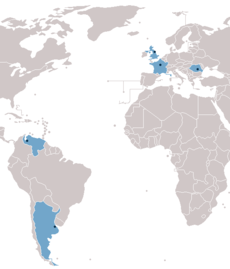LGBT rights in Juclandia
This article needs to be updated. |
| LGBT rights in the Federal Union of Juclandian Lands | |
|---|---|
 Claims of the FUJL | |
| Same-sex sexual activity legal? | Legal |
| Gender identity/expression | Varies by province (see below) |
| Recognition of relationships | Varies by province (see below) |
| Adoption | No existing laws in function |
| Military service | Legal |
| Discrimination protections | None (Laws protecting LGBT+ persons from discrimination exist in Sabia and Verona) |
Lesbians, gays, bisexuals and transexuals enjoy few rights in the Federal Union of Juclandian Lands, and legislation regarding LGBT topics varies vastly from province to province. By federal conviction, homosexuality is legal in all eight provinces of the Federation in agreement with the Constitution.
Laws regarding homosexuality
The Constitution of the Federation regards homosexual activities as legal. Since the Federal Law topples all provincial legislation, homosexuality is considered legal in all eight provinces of the Federation. However provincial legislation regarding homosexuality can differ from the Federal Constitution's statutes. Only Juclandia and Sabia and Verona have enacted laws legalizing homosexual activities. Homosexuality is considered illegal by provincial law in Burlatia, and it was decriminalized in Juclandia in 2010.
Recognition of same-sex relationships
Same-sex marriage for provincial citizens is legal in the provinces of Juclandia, Sabia and Verona and Ayrshire, but since no federal law covers personal union issues, it remains illegal in many provincial legislations. Same-sex marriage has been legal in Juclandia ever since the introduction of marriage laws in the region in March 2013, and it was legalized in Sabia and Verona when the first same-sex couple married in August 2013.
Presently, out of the five macronations that enclave FUJL territories, three recognize same-sex marriage at a national level: France, the United Kingdom and Argentina; while the remaining two do not officially recognize SSM (Romania and Venezuela).
Living conditions
Provincial society
Living conditions for provincial citizens in Lenia, Leonida, Burlatia, Urcensia and Ayrshire are generally unknown and LGBT topics aren't usually discussed in these societies.
Juclandia's provincial society is considerably liberal and tolerant compared to the western mark it's submitted to. While the Orthodox Church plays an important role in the Juclandian provincial population, homosexuality, bisexuality and transgenderism aren't stigmatized by the nation's most professed religion. LGBT persons aren't generally frowned upon in Juclandia and there is no general social discrimination against the LGBT community, which explains the absence of hate crime laws relating to sexual orientation.
The Sabioveronese provincial society, unlike its Juclandian counterpart, is heavily influenced by western societal norms. However the southernmost province of the Federation remains one of the most open-minded and gay-friendly places under Federal Juclandian jurisdiction. In 2014 openly gay Léon Galieri was elected Enkâkourak, the head of government of the Kingdom.
Federal society
The Juclandian Federal society is extensely diverse. Unlike Provincial Juclandia, the Federal society is subjected to many of the social stigmas and taboos present in the societies of the countries housing Juclandian Federal citizens. The socially conservative attitude towards homosexuality and LGBT issues in Romania has certainly influenced the Federal citizenry originating from this country, which composes over 67% of the Federation's population. Federal communities in more liberal places like France and the United Kingdom are less prone to discriminate against LGBT persons within their own borders.
A poll conducted in September 2015 by Sourg ê Mourg, the newspaper wing of the National Artists' Guild of Sabia and Verona, revealed 73% of the Sabioveronese federal population believed same-sex couples should have the right to marry, while 14% were against and 9% were "not sure". Another poll released by the same newspaper later that month revealed 82% of Sabia and Verona's federal citizens believed homosexuality should be accepted by society, while 9% believed it shouldn't and 9% were unsure.
Laws against discrimination
The Federal Constitution briefly grasps sexual orientation and gender affairs in Article 5, Title 1, which states all citizens of the Federation are equal in the eyes of the state regardless of their sex, gender and sexual orientation.
Provincially, Juclandia's provincial constitution states the equality of all citizens regardless of their sex, gender and sexual orientation in a similar fashion to the Federal Constitution. Only Sabia and Verona has gone further and enacted laws penalizing discrimination against LGBT+ persons. The Ley contra la Discriminación basada en el Género y/o la Orientación Sexual or Ley Ángel as it is commonly known was approved with 18 out of the 20 votes in the Sabioveronese Chamber of Deputies on 3 July 2014. The Sabioveronese Constitution also specifies protection for every citizen against discrimination based on "gender, sex and orientation", among others, in Article XLVIII.
Summary table
| Right | JCL | LEN | LND | SIV | BRL | UCS | ASH |
| Same-sex sexual activity legal | |||||||
| Same-sex legal unions | |||||||
| LGBTs allowed to serve openly in the military | |||||||
| Right to change legal gender | |||||||
| Anti-discrimination laws in housing/employment | |||||||
| Hate crime laws relating to sexual orientation* |